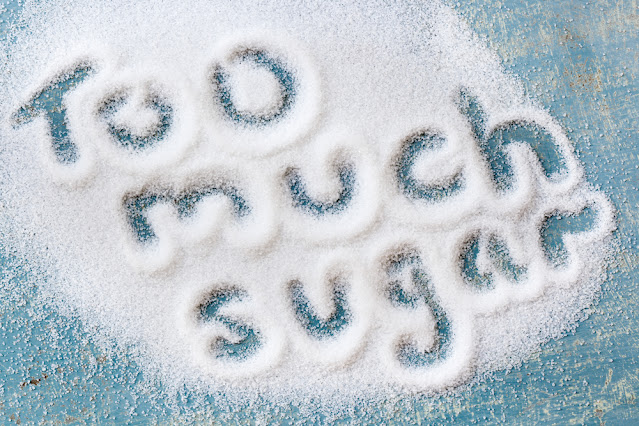Sugar the bitter truth
When we think of sugar, our minds often drift to visions of a
delectable treat - a deliciously sweet cupcake topped with swirls of cream
frosting, or perhaps bright rainbow lollipops dancing off the tongues of
excited children. But while these treats may be enjoyable in moderation, there
is much more lurking beneath the surface when it comes to the consumption and
effects of sugar. The bitter truth is that too much added sugar can have
serious negative impacts on your health, both short- and long-term. In this
blog post, I'm going to take a deeper look into all aspects of sugar - from how
it's used by food manufacturers to why it should be consumed in moderation. By
exploring this important topic as objectively as possible I hope to empower
readers with an understanding that will allow them make healthier decisions
when choosing which foods and beverages they put into their bodies!
Unveiling the dangers of sugar consumption
- what it can do to your body
If you think sugar is sweet and harmless, the bitter truth is
that sugar can be quite harmful and damaging to your body. While sugar provides
energy to keep us going, it is important to understand if we start consuming
sugar in excess amounts, it can have detrimental effects on our physiology. The
rise in sugar intake has led to a myriad of health problems such as obesity,
dental decay, Adrenal fatigue, cardio-metabolic diseases such as type 2
diabetes and hypertension. Thus sugar should be consumed in moderation.
Otherwise sugar from processed foods, sugar drinks and sweet desserts can act
like slow poison for our bodies.
Different types of sugar and which ones are
the most harmful
Sugar can have a sweet taste and make food enjoyable, but sugar
can also be a bitter truth. Not all sugar is the same; the difference lies in
the sources. As sugar is found in certain fruits and vegetables, those types of
sugar are natural and not as harmful as processed sugars. Some of the most
common processed sugars are: white sugar, brown sugar, corn syrup,
high-fructose corn syrup, molasses, coconut sugar, honey, agave nectar, and
maple syrup. Of these common processed forms of sugar, white sugar is thought
to be the least healthy choice due to its low nutrient content while brown
sugar has a slightly higher nutrient level than that of white sugar. Consuming
large amounts of these sugar types can be damaging to your overall health. The
best approach when considering sugar intake is moderation - eating a
well-rounded diet filled with fruit, vegetables and whole grains will keep you
feeling energized and well nourished.
How to identify hidden sugars in food
labels and how to reduce your intake
Sugar – the bitter truth is that it is hidden in many everyday
foods and drinks. Identifying sugar in food labels can be tricky, as the most
common sugar on ingredient lists is often referred to by different names like
sucrose, glucose and maltose. To spot sugar-related ingredients quickly, look
for words that end with 'ose' when reading food labels. Additionally, some food
items also have sugar as part of their nutrition facts, where it might be
listed under carbohydrates instead of sugar; this is especially true for
low-fat products. To reduce your sugar intake, try to eat natural foods without
any added sweeteners and limit processed foods high in sugar such as soda,
candy, baked goods, fruit juices and more.
Natural alternatives to sugar that are
better for your health
Sugar has been called the bitter truth, and for good reason.
Consuming sugar in excess can be detrimental to one's health, leading to a
plethora of medical problems. The good news is that there are many natural
alternatives to sugar that can help you maintain your health while still
satisfying your sweet tooth. Options like stevia, date syrup, and even honey
can be much healthier substitutes for sugar when used in moderation. Not only
that, but they also make fantastic additions to baked goods, breakfast
porridges, smoothies and more! Experimenting with these natural options is a
great way to reduce sugar intake without sacrificing tasty treats.
Tips for cutting down on sugar consumption
Learning to reduce sugar is an important part of a healthy and
balanced lifestyle. Being aware of sugar the bitter truth—that sugar can be
hidden and lurking in all sorts of processed foods, drinks, and even
condiments—is the first step. To avoid sugar-laden foods, reach for fresh or
minimally-processed options like lean proteins, fruits and vegetables, nuts,
and legumes. Taking time to read nutrition labels can also help you determine
sugar content in food items. Lastly, try to replace sugar-infused beverages
with sugar-free drinks containing natural flavors like syrup derivatives or
plant concentrates rather than sugar for a healthier alternative. By becoming
conscious of your own sugar intake habits, and implementing these tips into
your daily routine, you’ll discover that cutting down on sugar isn't as
difficult as it may seem!
Understanding emotional eating and how to
regulate cravings for sugary treats
Eating sugar has become such an ingrained habit in our lives
that sugar cravings are an ever-present struggle. Too often, we turn to sugar
as a quick and easy way to boost our mood and lift our spirits during times of
stress. Unfortunately, sugar can have the opposite effect with long-term
physical and mental side effects like weight gain, increased risk of heart
disease, addiction or altering your body’s ability to regulate sugar levels.
Understanding why sugar cravings occur is key for anyone looking to manage
them. To combat sugar cravings, it helps to approach them with mindfulness and
address any underlying emotional issues that can be causing them in the first
place. Prioritizing healthy eating habits including better sleep and regular
exercise are great ways of reducing sugar cravings while still honoring your
sweet tooth! Our relationship with sugar is complicated but by learning to
manage our cravings we can make a healthier choice in the long run - sugar, the
bitter truth!
FAQs
Q. What is the healthiest alternative to sugar?
A. The healthiest alternatives to sugar include natural
sweeteners such as stevia, date syrup, honey, and agave nectar.
A. Added sugars are usually listed under different names such as
sucrose, glucose or maltose - look out for words that end with 'ose' when
reading food labels. Additionally, some food items have sugar under
carbohydrates instead of sugars; this is more common in low-fat products.
Q. What tips can help me reduce my sugar intake?
A. To reduce your sugar intake, try to eat natural foods without
any added sweeteners and reduce your intake of processed foods. Additionally,
reading nutrition labels, replacing sugary beverages with sugar-free drinks and
being mindful of emotional eating can all help you regulate cravings for sugary
treats. Lastly, prioritizing healthy eating habits including better sleep and
regular exercise are great ways of reducing sugar cravings while still honoring
your sweet tooth! With some dedication and understanding, it is possible to
manage our cravings and make healthier choices.





0 Comments